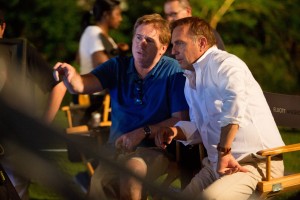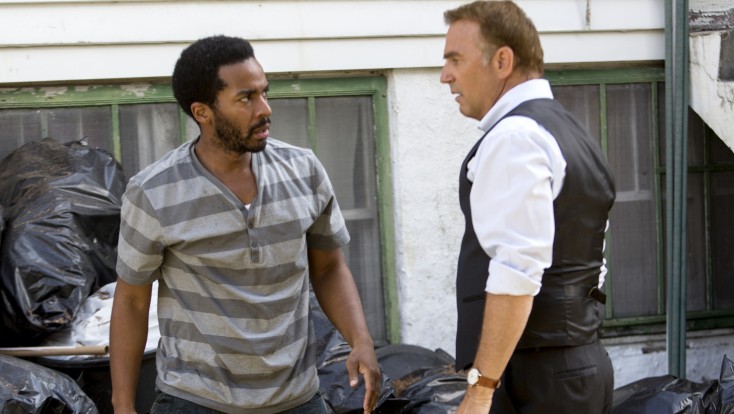
Director Mike Binder discusses a scene with star Kevin Costner on the set of Relativity Media’s BLACK OR WHITE. © 2014 BLACKWHITE, LLC. CR: Tracey Bennett
By ANGELA DAWSON
Front Row Features
HOLLYWOOD—Oscar winning filmmaker and actor Kevin Costner (“Dances With Wolves,” “Field of Dreams”) grew up in ethnically diverse Compton and other Southern California communities, where simmering racial and ethnic tensions sometimes boiled to the surface. So when he read Mike Binder’s screenplay “Black or White,” which tackles the subject of race relations head-on, he knew he had to ensure that the picture would get made, so came onboard not only as the star of the film but he also as a producer.
Binder, a veteran film and TV show director and actor, was inspired to write the screenplay from his own experience. After his wife’s sister died, leaving a 7-year-old biracial child without parents, Binder and his wife and one of her brothers stepped in to help raise the boy, bringing him from their Santa Monica home to his estranged father’s family in South Central for weekend visits. Binder was struck by the differences between the two worlds, located just a dozen or so miles apart, as well as some remarkable similarities.[private]
The filmmaker says he wanted to make a film about how, as a country, we can move forward in race relations and begin a dialogue. Costner, who previously starred in Binder’s family drama “The Upside of Anger,” concurred. This all happened well before the marches and riots that followed police-involved incidents in Ferguson, Mo., New York and L.A., that have reignited the subject of race relations in this country.
Twice married, Costner is the father of seven, so he knows a bit about child rearing. However, the character he plays in “Black or White,” Elliott, is a successful Los Angeles attorney, whose wife has recently passed away and he is left to care for their biracial granddaughter. Busy with his work and an undiagnosed alcoholic, Elliott knows very little about little Eloise (played by newcomer Jillian Estell), despite the fact that she grew up in his spacious suburban home. His white daughter, as it turns out, died in childbirth, and the black father has been AWOL for most of Eloise’s life. However, the child’s paternal grandmother (played by Oscar winner Octavia Spencer) and her extended family want custody of the 7-year-old. She believes she can offer Eloise, who is black, a better upbringing.
Costner, 60, is enjoying a bit of a resurgence in his acting career with the success of the 2012 HBO miniseries “Hatfields & McCoys,” and last year’s theatrical releases “3 Days to Kill,” the sports drama “Draft Day” and the rebooted Jack Ryan franchise. Costner also stars in the upcoming sports drama “McFarland, USA,” in which he plays the high school cross-country coach to a group of underprivileged Latinos. The still boyish-looking actor recently spoke about why he wanted to make a socially relevant film.
Q: You got onboard with this pretty quickly. What was it about the script or Mike Binder or the story that really appealed to you?
Costner: Mike wouldn’t quit bugging me. After the sixth (phone call), I said, “Okay!” It was really like when your brother is holding you down threatening to hock a loogie on you. I go, “Okay, I’ll do it.” (He chuckles.) No, that’s awful, what I just said. Actors are looking for great parts and we are asked to open scripts all the time. The bigger your careers get, the more scripts flow. Too often, when you open a script, it just doesn’t ring a bell. Everybody can write, but not everybody can really write. A screenplay is an art form. What happens is some of the films that have really propped up my career all had the same thing in common. On the first page, they started to sing in their own little way. This screenplay started that way. It was just carefully crafted, and it became the movie that you see. Every page I turned, I was surprised. Every page I turned, I wish I might have said that. I thought that that’s what I would say, and sure enough Mike wrote it. It was in the magic of a great screenplay and a story, in this instance, of the times that we’re living made so much sense to me. When my heart broke into a thousand pieces on the last page, I know that this was a movie that I was going to try and have made.
Q: What was it like working with your young co-star Jillian Estell, who plays your granddaughter Eloise)?
Costner: We were lucky. It came down to three girls. I’ve said before, two hearts break, and one can possibly change their lives. What I hope is it doesn’t change Jillian’s life. I hope that this is a moment that shines for her and that she chooses to go on in this profession, and that she continues to conduct herself the way she conducted herself on our set. We were lucky and we needed to. When we selected her we can’t say for sure we knew it was going to work. That had to do a lot with Jillian, and how she came to set every day.
Q: Your character, Elliott, is affluent and can give his granddaughter every material thing including a private school education, but her grandmother Rowena (Octavia Spencer) thinks that he is unable to give her the kind of love and attention she deserves. Rowena’s lawyer brother (played by Anthony Mackie) argues that the girl is better off with his sister because she can offer Eloise a family and people of her race. What can you say about the issue of black and white in this film?
Costner: It was powerful to hear Anthony do that speech in the courtroom. It was powerful to see Octavia in that driveway speaking for everyone who was watching closely and everyone who knows what time it is out there in the world when you have to straighten somebody out that’s closest to you. I believe we succeeded. Every movie has to get lucky. Every movie you have to work hard. And we had that.
Q: You play a man struggling with alcoholism. What was the most challenging part of this role?
Costner: We were smart enough to understand that what was written was something that maybe we need to be saying for ourselves, for our generation, for our own culture. The beauty of being an actor is sometimes we’re going to be forever remembered as the people who say these things and say them with a level of conviction and a level of passion because we want this veil lifted. We want it moved. This movie didn’t propose that they could be that. It’s just a jumping-off point to have this conversation. You have to understand that when I read this I thought that was possible. This isn’t a wish that everybody in America should go see it, but it is. We think we know what this conversation is, but white people don’t know what it’s like to be black. We don’t get it. We don’t know for sure. We can empathize and that’s an absolute because that’s part of the human condition to be able to empathize with someone else that you don’t know.
There’s the opposite idea that we have to move forward, which is an absolute. So how do we go about doing this? These things that we weren’t smart enough to write, as actors, we are going to forever be identified with being those people (on film) saying these things.
Q: How did you prepare for this role, and especially the tense courtroom scene?
Costner: I was nervous. I was scared because it was so good, I knew I had to get it right and I knew I immediately was the only person that could blow it. Fear motivates me a lot. In that courtroom, my fellow actors knew that I had a really good speech. We all know when it’s somebody’s time to step up, and I knew when it was Anthony’s time to step up, and he nailed it. I knew when it was Octavia’s time and she nailed it. Here I am come “Mr. White Oscar Winner,” and now it’s my moment in the courtroom. I knew what was at stake. I want to prop up the movie up and I want to stand as tall as my fellow actors did.
How did I prepare? A lot. Every night, because (this film) was important to me. It’s not more important than any other film, but it was what I was choosing to do at this point in my life and it was important to me. I’ve always told me children that if you treat something importantly, chances are people will treat you importantly.[/private]



